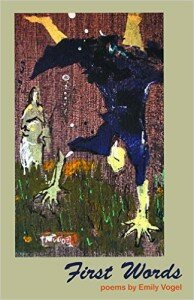First Words
By Emily Vogel
ISBN 978-1630450168
June 2015
NYQ Books
Review by Brian Fanelli
Though the northeastern winters serve as a background for several of the poems in Emily Vogel’s collection First Words, there‘s a tenderness and intimacy beneath the book’s howling winds and snowfall, a celebration of love between the narrative’s speaker, her husband, and their firstborn daughter. First Words, however, is not simply a collection of love poems or meditations on motherhood. There are larger themes at stake, including language, the metaphysical, and a country increasingly prone to violence and hyper-consumerism.
Frequently, there‘s interesting juxtapositions of images at work. In the poem “First Snow,” for instance, the winter setting is referred to as “a strange euthanasia of gray.” Certainly, the image evokes the loss of life winter causes, but it’s contrasted with the love between the speaker and her partner, who is referred to as “the essence of song/in a warm room.” The husband is something constant and reliable, a foundation, and as the poem says, they will always return to each other.
In another poem, “White Christmas,” the speaker drives home and throws herself into her husband’s arms. Again, the husband—and the sleeping infant in the next room—serve as something stable. All but the closing stanzas contains Christmas images, but the carolers have faces that “reflect dimensions of apprehensions,” and the speaker imagines that that they are pondering “guns/bank accounts, the magic of a blinking digit.” These images cause tension and reflect the capitalistic aspects of the holiday, but by the end of the poem, family is the anchor, something pure and true.
Other poems address larger cultural issues and undertones of violence. “Sequestering,” for instance, references zombies, claims of God as a hoax, and fears of getting shot in the supermarket. It‘s as though these references are threats to the safe domestic space, where the newborn daughter “gasps delightedly,” the husband laughs at old movies, and the snow, too, acts as a protective barrier.
In “Events,” Vogel again employs some apocalyptic imagery to address society’s larger ills. One section of the prose poems reads, “The war proliferated like neighborhoods/like families, like vacations in exotic places. A fire burnt/down the city.” The poem is one of the most biting, in that it also tackles indifference and hyper-consumerism with the concluding lines, “And then everyone involved got into their/warm cars and drove around, with no particular destination/in mind and thought a lot about what happened for a while.”
The end of the book circles back to family, with a poem dedicated to the author’s daughter. “Dear Clare” is a mix of memories of the daughter’s infant years and mediations on her future, and it includes the line, “I wonder if one day you will know/that poetry can often be as basic as a bank receipt.” On the one hand, Vogel has a knack for writing about the ordinary, about images of snowfall and her daughter laughing at images on TV. On the other hand, this collection constantly pushes deeper. Despite the violence that may exist in the world, Vogel illustrates how relationships and love stand as a stark contrast to those ills.


